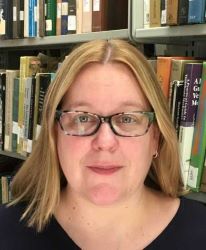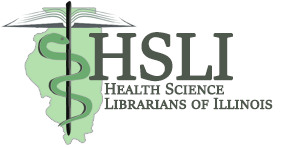 Elizabeth (Betsy) Sterner, MS, MLIS, is the Health and Human Services librarian at Governors State University (GSU). Her report about her experience at the HSLI 2019 Conference is shared.
Elizabeth (Betsy) Sterner, MS, MLIS, is the Health and Human Services librarian at Governors State University (GSU). Her report about her experience at the HSLI 2019 Conference is shared.
I am grateful for the opportunity to attend the HSLI 2019 Conference, Going Forward, Looking Back, in Champaign, IL. I would like to thank the Conference Planning Committee and all members of HSLI.
The conference included presentations, posters, and discussions on scholarly publishing, physical space and collection considerations, citation management, accessibility, critical appraisal, and updates from NNLM/GMR, IACRL, RAILS, IHLS, CARLI. Lisa Janicke Hinchliffe presented the keynote address entitled, “From One Big Deal to Another? Libraries in an Open Access Age.” There were also presentations by Kirstin Duffin entitled “Citation Management Software: Advancing your expertise with freely available tools” and by JJ Pionke entitled “Making your Library Positively Accessible.” After heading home, I spent the next days processing all that I have learnt while at the conference. While I have many ideas for new opportunities that I’d like to implement, I will highlight three that I believe are realistically possible and that will help me engage more deeply with the faculty, students, and staff at Governors State University Library.
First, I want to begin a reading club at GSU. GSU is a comprehensive public university offering degree programs at the undergraduate, master’s, and doctoral levels. When I heard the presentation from NNLM/GMR about the Reading Club, I knew this would be a hit with students, faculty, and staff at GSU. The NNLM Reading Club provides the structure of “ready-to-use” book titles and free discussion guides to promote health information discussions. The selected award-winning and national bestseller books, including fiction, nonfiction, memoirs, graphic novels, and young adult titles, align with the NIH All of Us Research Program. Applications for free NNLM Reading Club Book Kits including books and discussion guides are available online. Health topics include LGBTQ Health, Mental Health, Heart Health, Family Health, ADA Health, Immunization Health, and Healthy Aging. This program offers the opportunity to receive a free kit including books and discussion guides that I believe will be of interest to patrons.
Second, I want to offer a workshop to faculty and graduate students on scholarly publishing. I attended Dan Tracy’s presentation entitled,”Issues in Scholarly Communication for the Health Sciences.” He discussed types of open access publishing, various types of metrics used, and the confusion that often exists between the different terminologies. I plan to create a research guide that covers key journals within my liaison areas and includes considerations for authors before they submit an article to a journal. I will include open access journals that may be important within a specific subfield regardless of the impact factor. Dan Tracy warned against trying to maintain a list of all open access journals within a field.
Third, I am very inspired by Laura Menard’s presentation entitled, “Teaching Critical Appraisal to Students in the Health Sciences”, to develop critical appraisal information sessions for students in the health sciences. She covered the importance of these skills and how to critically appraise the following three study types: therapy, diagnosis, and systematic/meta-analysis reviews. I learned how to identify best practices in study design, methodology, and outcome reporting. We used both well and poorly designed journal articles to improve our own critical appraisal skills. After the session, I understand therapy calculations (e.g., relative risk reduction), harm calculations (e.g., absolute risk increase), and diagnosis calculations (e.g., sensitivity and specificity). I am looking forward to sharing this information with colleagues and developing workshops for students in the health sciences.
I want to thank everyone who presented a talk or a poster. The conference has introduced me to so many new ideas. I hope to use the knowledge I have learned and share it with fellow colleagues, faculty, and students. Thank you again to all who made this conference such a positive learning experience for me.
